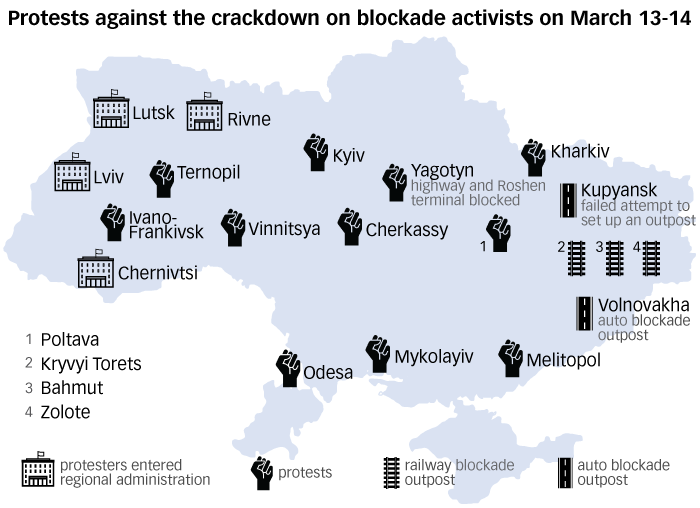See a photo gallery on the March 13 protest in Kyiv and a gallery on the March 14 rally.
Protests erupted all over Ukraine on March 13-14 against a police crackdown on the blockade of trade with Russian-occupied territories in the Donbas.
On March 13, the police and the Security Service of Ukraine (SBU) arrested 43 activists who had been blocking trade with the Russian-occupied territories at the Kryvy Torets blockade outpost in Donetsk Oblast.
After the police took over the outpost, the activists were released, on March 14.
Samopomich lawmaker Semen Semenchenko, one of the organizers of the blockade, claimed on March 14 that the authorities were planning to storm other blockade outposts as well. He said that several blockade activists had been arrested on March 14 again.
“(The authorities) have already provoked a civil war, and people will start revolts all over the country,” Leonid Lytvynenko, a member of the OUN volunteer battalion and a blockade activist, told the Kyiv Post. “Many people call me and say they are moving either to Kyiv or to the Donbas to support the blockade.”
Activists supporting the blockade entered the regional administration buildings in Lviv, Volyn, Rivne and Chernivtsi oblasts during the night of March 13, demanding that the local authorities call for the release of the activists, and the dismissal of those who ordered the crackdown -Interior Minister Arsen Avakov, Deputy National Police Chief Vyacheslav Abroskin, and SBU Deputy Chief Vitaly Malikov.
Malikov has been accused of supporting Russian-backed separatists when he was a local lawmaker in Sevastopol in February to March 2014 and voted for cracking down on EuroMaidan protesters in January 2014. Absoskin, also a native of Sevastopol, reportedly tried to serve Russian-installed occupation authorities as a police official in Crimea in 2014 before moving to mainland Ukraine. They deny the accusations.
The protesters also called for a ban on trade with the Russian-occupied territories and the passing of a law on the status of the Russian-occupied territories.
As a result, the legislatures of Lviv, Ternopil, Ivano-Frankivsk, Chernivtsi, Rivne and Volyn oblasts on March 14 passed resolutions in support of the protesters’ demands.

Map of the protests against the crackdown on blockade activists on March 13-14
In the town of Yagotyn in Kyiv Oblast, blockade supporters blocked supplies from a logistics terminal of President Petro Poroshenko’s Roshen confectionary.
Protests were also held in Kyiv, Ivano-Frankivsk, Ternopil, Vinnytsya, Kharkiv, Odesa, Melitopol, Poltava and Mykolayiv. Some protesters burned tires – a symbol of the 2013-2014 EuroMaidan Revolution.
In Kyiv, about 300 protesters assembled on Maidan Nezalezhnosti late on March 13 and went to the Presidential Administration building on Bankova Street.
The protest was backed by a broad coalition of political forces, in contrast with previous protests, which were mostly supported by fringe groups.
The March 13 rally was attended by Samopomich lawmaker Yegor Sobolev; Oleh Berezyuk, leader of the Samopomich Party’s parliamentary faction; Davit Sakvarelidze from ex-Georgian President Mikheil Saakashvili’s Movement of New Forces; Vasyl Hatsko, the leader of the Democratic Alliance; Mykola Kokhanivsky, the leader of the OUN volunteer battalion, and Artem Skoropadsky of the Right Sector nationalist group.
The crackdown on the blockade was also condemned by the Batkyvshchyna and Ukrop parties.
Saakashvili and the AutoMaidan car-based protest movement on March 13 announced a nationwide protest “mobilization.”
The protesters’ mood was tense and angry, with some even calling for the storming of government buildings.
“(Ex-President Viktor) Yanukovych’s occupation regime, which we attempted to overthrow during the Revolution of Dignity, has been completely resurrected,” Kokhanivsky, a nationalist known for his high-profile radicalism, said at the Kyiv rally. “When there are 100,000 of us, (the authorities) won’t be able to defend themselves. We will enter their buildings.”
He went on to call for the “lynching” of top officials.
“They’re like a hydra whose heads constantly grow again,” Kokhanivsky added. “Even if there are 10,000 of us, I’m ready to take responsibility for storming (government buildings).”
About 200 pro-blockade protesters held another rally in Kyiv late on March 14. Kokhanivsky led some of the protesters to attack the offices of tycoon Rinat Akhmetov, whose businesses are partially located in Russian-occupied territories, and Russia’s Alfa Bank.
Apparently reacting to the blockade scandal, President Petro Poroshenko said at a meeting with Luxembourg’s Foreign Minister Jean Asselborn on March 14 that Ukraine would not have any trade links with the Ukrainian businesses that were seized by Russian-backed separatists in response to the blockade.
Kyiv Post staff writer Oksana Grytsenko contributed to this report.
